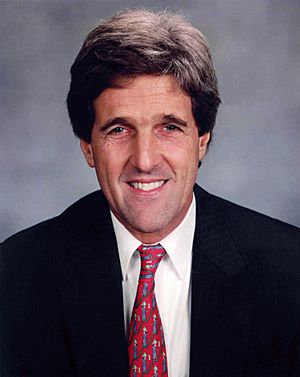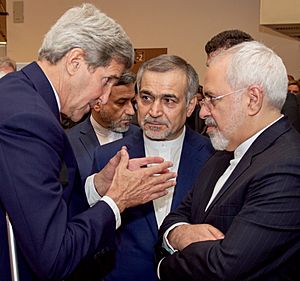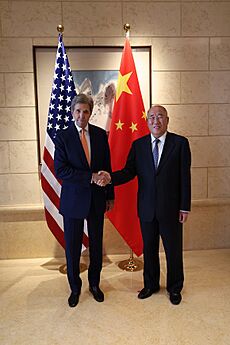John Kerry facts for kids
Quick facts for kids
John Kerry
|
|||||||||||||||||||||||||||
|---|---|---|---|---|---|---|---|---|---|---|---|---|---|---|---|---|---|---|---|---|---|---|---|---|---|---|---|
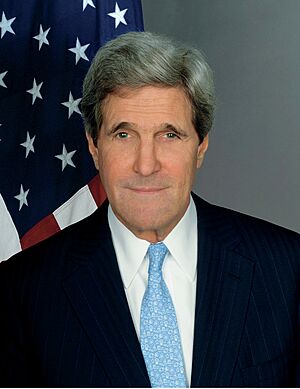
Official portrait, 2013
|
|||||||||||||||||||||||||||
| 68th United States Secretary of State | |||||||||||||||||||||||||||
| In office February 1, 2013 – January 20, 2017 |
|||||||||||||||||||||||||||
| President | Barack Obama | ||||||||||||||||||||||||||
| Deputy | William J. Burns Wendy Sherman (acting) Antony Blinken |
||||||||||||||||||||||||||
| Preceded by | Hillary Clinton | ||||||||||||||||||||||||||
| Succeeded by | Rex Tillerson | ||||||||||||||||||||||||||
| United States Special Presidential Envoy for Climate | |||||||||||||||||||||||||||
| In office January 20, 2021 – March 6, 2024 |
|||||||||||||||||||||||||||
| President | Joe Biden | ||||||||||||||||||||||||||
| Preceded by | Office established | ||||||||||||||||||||||||||
| Succeeded by | John Podesta (Senior Advisor) | ||||||||||||||||||||||||||
| United States Senator from Massachusetts |
|||||||||||||||||||||||||||
| In office January 2, 1985 – February 1, 2013 |
|||||||||||||||||||||||||||
| Preceded by | Paul Tsongas | ||||||||||||||||||||||||||
| Succeeded by | Mo Cowan | ||||||||||||||||||||||||||
|
|||||||||||||||||||||||||||
|
|||||||||||||||||||||||||||
| 66th Lieutenant Governor of Massachusetts | |||||||||||||||||||||||||||
| In office January 6, 1983 – January 2, 1985 |
|||||||||||||||||||||||||||
| Governor | Michael Dukakis | ||||||||||||||||||||||||||
| Preceded by | Thomas P. O'Neill III | ||||||||||||||||||||||||||
| Succeeded by | Evelyn Murphy | ||||||||||||||||||||||||||
| Personal details | |||||||||||||||||||||||||||
| Born |
John Forbes Kerry
December 11, 1943 Aurora, Colorado, U.S. |
||||||||||||||||||||||||||
| Political party | Democratic | ||||||||||||||||||||||||||
| Spouses |
|
||||||||||||||||||||||||||
| Children |
|
||||||||||||||||||||||||||
| Parents | Richard Kerry Rosemary Forbes |
||||||||||||||||||||||||||
| Relatives | Forbes family | ||||||||||||||||||||||||||
| Alma mater | |||||||||||||||||||||||||||
| Occupation |
|
||||||||||||||||||||||||||
| Civilian awards | Presidential Medal of Freedom (2024) | ||||||||||||||||||||||||||
| Signature |  |
||||||||||||||||||||||||||
| Military service | |||||||||||||||||||||||||||
| Allegiance | United States | ||||||||||||||||||||||||||
| Branch/service | United States Navy | ||||||||||||||||||||||||||
| Years of service | 1966–1978 | ||||||||||||||||||||||||||
| Rank | Lieutenant | ||||||||||||||||||||||||||
| Unit |
|
||||||||||||||||||||||||||
| Commands |
|
||||||||||||||||||||||||||
| Battles/wars |
|
||||||||||||||||||||||||||
| Military awards |
|
||||||||||||||||||||||||||
John Forbes Kerry (born December 11, 1943) is an American politician and diplomat. He served as the 68th United States Secretary of State from 2013 to 2017 under President Barack Obama. As a member of the Democratic Party, he was a U.S. Senator from Massachusetts for 28 years.
In 2004, Kerry was the Democratic nominee for President of the United States. He ran against the president at the time, George W. Bush, but lost the election. Later, he became the first U.S. Special Presidential Envoy for Climate, a role created to address climate change. He served in this position from 2021 to 2024 under President Joe Biden.
Before his political career, Kerry served in the United States Navy during the Vietnam War. He was a decorated veteran who later became a well-known activist against the war. After his military service, he became a lawyer and then entered politics. In May 2024, President Biden awarded him the Presidential Medal of Freedom, one of the highest honors for a civilian in the United States.
Contents
Early life and school
John Forbes Kerry was born on December 11, 1943, in Aurora, Colorado. His father, Richard, was a diplomat, and his mother, Rosemary, was a nurse and activist. Because of his father's job, Kerry's family moved around a lot. He lived in Massachusetts and Washington, D.C., and even spent time in Berlin, Germany, and Oslo, Norway.
Kerry attended several elite boarding schools, including one in Switzerland. He finished high school at St. Paul's School in New Hampshire, where he became interested in politics and public speaking. He even played bass in a rock band called The Electras.
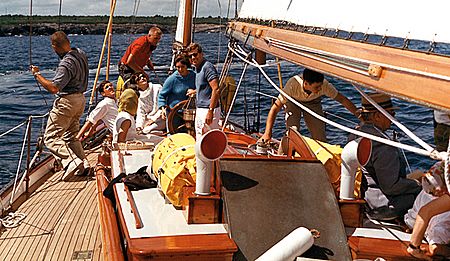
In 1962, Kerry started at Yale University, where he studied political science. At Yale, he was the president of the Yale Political Union and a member of the Skull and Bones society. He became known for his skill in debates and gave speeches that were critical of U.S. foreign policy, especially during the Vietnam War. He graduated from Yale in 1966.
Military service in the Vietnam War
After graduating from Yale in 1966, Kerry joined the U.S. Naval Reserve. He became an officer and asked to serve in South Vietnam. He commanded a small, fast boat called a "Swift boat." These boats patrolled the coasts and rivers.
During his service, Kerry was wounded three times and received three Purple Heart medals. He also earned a Silver Star Medal and a Bronze Star Medal for his bravery in combat.
Silver Star and Bronze Star
Kerry received the Silver Star for his actions on February 28, 1969. During a mission, his boat came under heavy fire. He led a charge against the enemy position and chased down an enemy soldier who was armed with a rocket launcher.
He earned the Bronze Star on March 13, 1969, after a mine exploded near his boat. A Green Beret soldier, James Rassmann, was knocked into the water. Kerry turned the boat around under enemy fire and pulled Rassmann to safety.
Return from Vietnam
After being wounded three times, Kerry was allowed to leave combat duty. He returned to the United States in 1969 and worked as an aide to an admiral in New York. He left active duty in 1970 but remained in the Naval Reserve until 1978.
Anti-war activism
When Kerry returned home, he joined a group called Vietnam Veterans Against the War (VVAW). He became a spokesperson for the group and spoke out against the war. He believed the U.S. government's policies in Vietnam were wrong.
In April 1971, Kerry testified before a U.S. Senate committee about the war. The next day, he joined a protest where he and other veterans threw their military medals over a fence at the U.S. Capitol. They did this to show how strongly they opposed the war. Kerry said he was doing it "for peace and justice."
Early political career
After his activism, Kerry decided to enter politics. In 1972, he ran for a seat in the U.S. Congress from Massachusetts but lost the election. He then went to law school at Boston College and became a prosecutor in Middlesex County, Massachusetts.
In 1982, Kerry was elected Lieutenant Governor of Massachusetts, serving under Governor Michael Dukakis. This was his first major political office.
U.S. Senate career (1985–2013)
In 1984, Kerry was elected to the United States Senate, representing Massachusetts. He served in the Senate for 28 years and became a leading voice on foreign policy.
Iran-Contra hearings
Early in his Senate career, Kerry investigated the funding of rebels in Nicaragua known as the Contras. His investigation helped uncover the Iran–Contra affair, a major political scandal where the U.S. government secretly sold weapons to Iran and used the money to fund the Contras.
Other Senate work
Kerry was also involved in investigating the Bank of Credit and Commerce International (BCCI), a bank that was involved in illegal activities. His work helped shut down the bank in 1991.
Throughout his time in the Senate, Kerry worked on many issues, including the environment, small businesses, and veterans' affairs. He also worked to improve relations with Vietnam. In 2009, he became the chairman of the powerful Senate Foreign Relations Committee.
Iraq War vote
In 2002, Kerry voted to give President George W. Bush the authority to use military force in Iraq. He said he believed that Iraqi leader Saddam Hussein had dangerous weapons and was a threat. However, he also urged the president to try to find a peaceful solution first.
Later, when no weapons were found, Kerry became a strong critic of the war. He said that President Bush had misled the country.
2004 presidential campaign

In 2004, John Kerry won the Democratic Party's nomination for president. He chose Senator John Edwards of North Carolina as his running mate. Kerry's campaign focused on his experience in foreign policy and his criticism of the Iraq War.
The election was very close. Kerry lost to President George W. Bush, receiving 48.3% of the popular vote to Bush's 50.7%. In the Electoral College, Bush won 286 votes to Kerry's 251.
Secretary of State (2013–2017)
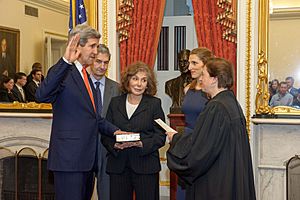
In 2012, President Barack Obama nominated Kerry to be the next United States Secretary of State, replacing Hillary Clinton. The Senate confirmed him, and he took office in February 2013. As Secretary of State, he was America's top diplomat.
Major diplomatic efforts
Kerry traveled the world to work on peace and security issues. Some of his major achievements include:
- Israeli-Palestinian Peace Talks: He brought Israeli and Palestinian leaders together for peace negotiations in 2013.
- Iran Nuclear Deal: He was a key negotiator in the agreement to limit Iran's nuclear program. This led to the Joint Comprehensive Plan of Action (JCPOA) in 2015.
- Syria's Chemical Weapons: After a chemical weapons attack in Syria, Kerry helped create a plan for Syria to give up and destroy its chemical weapons.
- Paris Climate Agreement: He was a strong advocate for action on climate change and signed the Paris Agreement on behalf of the United States in 2016.
Kerry also became the first U.S. Secretary of State to visit Cuba since 1945, helping to restore diplomatic relations between the two countries.
Special Presidential Envoy for Climate (2021–2024)
In 2021, President Joe Biden appointed Kerry as the first-ever U.S. Special Presidential Envoy for Climate. In this role, he was part of the National Security Council and led America's efforts to fight climate change around the world.
He worked with other countries, including China and India, to encourage them to reduce their carbon emissions and invest in clean energy. He attended international climate conferences like COP26 and pushed for stronger global commitments. Kerry left the position in March 2024 to help with President Biden's re-election campaign.
Personal life
John Kerry's family has a long history in America. His father's ancestors were originally Jewish and came from the Austro-Hungarian Empire. They converted to Catholicism and changed their last name from Kohn to Kerry. His mother was from the wealthy Forbes and Winthrop families, who were among the early settlers of Massachusetts.
Kerry was married to Julia Thorne from 1970 to 1988, and they had two daughters, Alexandra and Vanessa. In 1995, he married Teresa Heinz, a philanthropist and businesswoman.
Kerry is a Roman Catholic. In his free time, he enjoys sports like cycling, snowboarding, and sailing. In 2003, he was successfully treated for prostate cancer.
Images for kids
See also
 In Spanish: John Kerry para niños
In Spanish: John Kerry para niños
- List of foreign ministers in 2017
 | Leon Lynch |
 | Milton P. Webster |
 | Ferdinand Smith |


